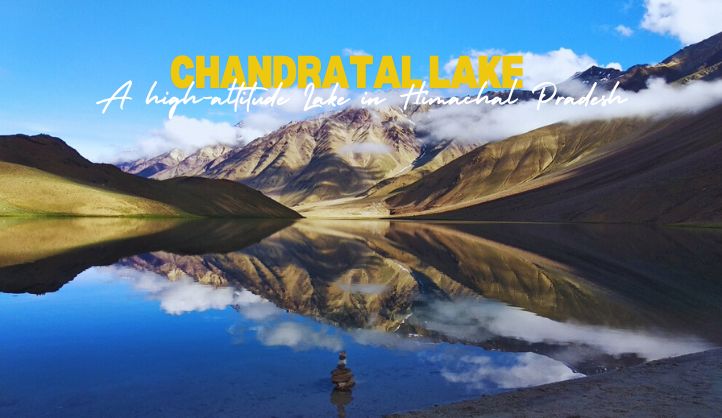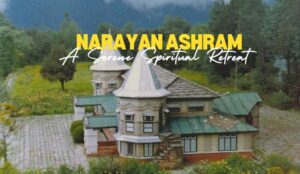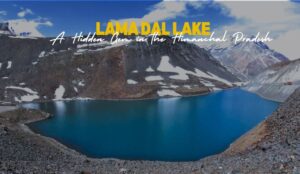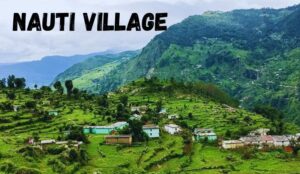Chandratal Lake, or “Moon Lake,” as it is famously known, is one of the most captivating natural wonders nestled in the rugged terrain of Himachal Pradesh, India. Surrounded by the barren yet beautiful landscapes of the Spiti Valley and the Lahaul region, this high-altitude lake holds a mystical charm that draws adventurers, trekkers, photographers, and nature lovers alike. With its pristine blue waters, majestic mountain views, and tranquil environment, Chandratal is an ideal destination for those seeking solitude and a connection with nature.
In this article, we will explore every facet of Chandratal Lake its location, significance, accessibility, best time to visit, nearby attractions, trekking routes, and much more. This will serve as a comprehensive guide to help you plan your visit to this mesmerizing lake and make the most of your experience.
Location and Accessibility
Chandratal Lake is situated at an altitude of approximately 4,300 meters (14,100 feet) above sea level. It lies in the Spiti Valley, a remote and less-explored region of Himachal Pradesh, and is roughly 120 kilometers from the town of Manali. The lake is nestled between the Chandra and Bhaga rivers, and it is accessible primarily via a treacherous yet rewarding trek.
The lake is also part of the larger Chandra-Tal Wildlife Sanctuary, which protects a wide range of flora and fauna, many of which are unique to the region. The mesmerizing lake, with its crescent shape, is surrounded by snow-capped peaks that reflect in its crystal-clear waters, creating a picture-perfect landscape.
Chandratal is well-connected by road to Manali, Kullu, and other important towns, but the journey involves a combination of steep climbs, rough roads, and at times, crossing through areas that are prone to landslides. The nearest motorable road to the lake is at a distance of 14 kilometers, from where you can either hike or ride a 4×4 vehicle to the lake’s campsite.
How to Reach Chandratal Lake?
To reach Chandratal Lake, here are the basic routes to follow:
- Via Manali: The most common route begins from Manali, a popular hill station in Himachal Pradesh, known for its scenic beauty and tourist appeal. From Manali, you can drive to Keylong and further to Batal. From Batal, a jeep or trekking route will take you to the base of Chandratal Lake, which takes about 4-5 hours depending on road conditions.
- Via Spiti Valley: Another approach is through the Spiti Valley, which can be accessed via the Kunzum Pass. This route is for those looking to explore more of the Spiti Valley and its distinctive culture. The drive from Kaza (the main town in Spiti) to Chandratal is around 60 kilometers, making it a longer but equally scenic journey.
- Via Trekking: Many travelers prefer to trek to Chandratal Lake as it offers a unique adventure. The trekking route, though challenging, rewards trekkers with stunning panoramic views of the surrounding mountains, glaciers, and valleys.
Significance and Mystique of Chandratal Lake
The name “Chandratal” translates to “Moon Lake” in Hindi, a name derived from its crescent-moon shape. The lake has been a source of fascination and intrigue for generations, not just because of its unique geographical features but also due to the myths and legends surrounding it.
In Hindu mythology, the lake is believed to be a resting place for the gods, and it is said that the lake was created by the moon god, Chandra, who is often associated with the sky and the night. It is said that Chandra (the moon) traveled across the skies and made this lake his resting place. According to some local legends, the lake was once visited by the Pandavas during their exile in the Mahabharata, adding a spiritual significance to the lake.
Chandratal Lake holds ecological importance too. The lake is home to several species of birds, including migratory species such as the bar-headed goose and the black-necked crane. The surrounding wilderness also offers a habitat to Himalayan brown bears, snow leopards, and a variety of mountain flora. The lake itself is also regarded as a symbol of purity, as its clear waters reflect the stunning mountain ranges and the ever-changing skies, creating a serene atmosphere that is hard to find elsewhere.
The Landscape Around Chandratal Lake
The landscape surrounding Chandratal Lake is nothing short of spectacular. The lake itself is nestled in a valley with an almost otherworldly setting. The terrain is marked by jagged mountain ranges, vast barren plains, and meadows dotted with wildflowers during the warmer months. The lake’s deep blue waters stand in stark contrast to the surrounding barren earth, creating a mesmerizing visual effect.
As the sun rises or sets over the lake, the colors of the water and sky change dramatically, offering countless opportunities for photography. Snow-capped peaks, alpine meadows, and grazing yaks add to the scenic beauty, making it a perfect spot for camping and stargazing.
Best Time to Visit Chandratal Lake
The best time to visit Chandratal Lake is during the summer months, from June to September, when the weather is more conducive to trekking and outdoor activities. During these months, the snow has melted, making the paths and roads more accessible. The climate remains cool, and the lake’s blue waters are visible in their full glory. The clear skies and comfortable temperatures also make this the perfect time for camping and photography.
For those looking for a more serene experience without the crowds, early summer or late autumn (May and September) can also be ideal. During this time, the landscape still boasts some snow, but the region is not as crowded as in peak summer.
Winter, from November to March, brings a harsh chill to the region, with temperatures plunging below freezing. This makes it impossible to reach the lake, as most roads remain closed due to heavy snowfall.
Trekking to Chandratal Lake
For adventurers and nature enthusiasts, the trek to Chandratal Lake is an unforgettable experience. The trek usually starts from Batal or Kunzum Pass and lasts anywhere between 2 to 3 days, depending on the chosen route and the pace of the trek. The trek is moderate to difficult, with steep climbs, narrow paths, and rocky terrain. However, the breathtaking vistas of the Himalayan ranges, valleys, and remote villages along the way make the effort worthwhile.
Popular Trek Routes to Chandratal Lake:
- Batal to Chandratal Trek: This is one of the most popular trekking routes, which takes about 2-3 days to complete. The route takes trekkers through the rugged Spiti landscape, with many stunning views of glaciers, mountain peaks, and barren terrain. The trek is best for those looking for a physically challenging route with magnificent views.
- Kunzum Pass to Chandratal Trek: Another scenic route starts from Kunzum Pass, a popular mountain pass in Himachal Pradesh. This trek offers panoramic views of the Chandra Bhaga ranges and the nearby valleys. The route is long, but the landscape it traverses is incredibly diverse and beautiful.
Both treks are challenging and require physical endurance, but they offer an unparalleled experience for trekkers looking to explore the unspoiled beauty of the Himalayas.
Camping at Chandratal Lake
Camping near the lake is one of the most rewarding experiences, as it allows you to immerse yourself in the serene beauty of the area. The campsite near Chandratal is equipped with basic amenities such as tents, sleeping bags, and kitchen facilities. Many tour operators organize camping trips, making it easier for visitors to access the lake without worrying about logistics.
Nearby Places to Explore Around Chandratal Lake
While Chandratal Lake is the main attraction in the region, there are several other beautiful and significant places to explore in the surrounding areas. These include:
1. Kunzum Pass
- Kunzum Pass, located at an altitude of 4,551 meters (14,931 feet), is a major mountain pass connecting the Lahaul and Spiti valleys. The pass offers stunning panoramic views of the surrounding mountains, including the Bara Shigri Glacier. It is also a sacred spot for many travelers, with a small temple dedicated to the local goddess.
- Things to do: Trekking, photography, and offering prayers at the Kunzum Mata Temple.
2. Spiti Valley
- Often referred to as the “Middle Land,” Spiti Valley is a rugged and remote area known for its Buddhist monasteries, ancient villages, and breathtaking landscapes. It is an offbeat destination that offers a glimpse into the traditional Tibetan culture and way of life.
- Things to do: Visit monasteries like Tabo Monastery (known as the ‘Ajanta of the Himalayas’), Key Monastery, and Dhankar Monastery. Explore the local villages and enjoy trekking camping, and cultural experiences.
3. Key Monastery
- Situated on a hilltop, Key Monastery is one of the largest and most important monasteries in Spiti Valley. It is believed to have been founded in the 11th century and has a rich history of Buddhist teachings. The monastery also offers panoramic views of the Spiti Valley.
- Things to do: Visit the monastery to learn about Tibetan Buddhism, explore the ancient artifacts, and enjoy views of the surrounding landscape.
4. Batal
- Batal is a small settlement situated on the banks of the Chandra River. It serves as the base camp for treks to Chandratal and offers a peaceful atmosphere for travelers. The area is known for its scenic beauty and is an ideal stopover for those heading to the lake.
- Things to do: Rest and prepare for the trek to Chandratal, take in the surrounding views of snow-capped peaks, and enjoy the quiet solitude of the region.
5. Manali
- Manali, a well-known hill station in Himachal Pradesh, serves as the main entry point for travelers heading to Chandratal. Known for its beautiful landscapes, adventure activities, and vibrant culture, Manali is a popular destination for tourists year-round.
- Things to do: Paragliding, skiing, trekking, rafting, visit Hidimba Temple, explore Old Manali, and enjoy the local cafes and markets.
6. Tabo Monastery
- Tabo Monastery is one of the oldest monasteries in the Himalayan region, founded in the 10th century. It is known for its well-preserved murals and frescoes, which are considered to be among the most significant examples of Tibetan Buddhist art.
- Things to do: Explore the monastery’s artwork, meditate in its peaceful surroundings, and learn about the history and culture of the Spiti Valley.
7. Dhankar Monastery
- Dhankar Monastery is perched on a cliff, offering stunning views of the Spiti Valley and the confluence of the Spiti and Pin Rivers. The monastery believed to be over 1,000 years old, is an important pilgrimage site for Buddhists in the region.
- Things to do: Visit the monastery, trek to the nearby Dhankar Lake, and admire the panoramic vistas from the top of the hill.
Bara Shigri Glacier
- Bara Shigri Glacier, one of the longest glaciers in the Himachal Pradesh region, is located near Kunzum Pass. The glacier is a popular spot for trekkers and mountaineers.
- Things to do: Trek to the glacier, enjoy the scenic beauty, and marvel at the expansive ice sheet.
Conclusion
Chandratal Lake, with its crescent shape and clear blue waters, is a must-visit destination for adventure seekers and nature lovers alike. The surrounding landscapes are equally captivating, with towering peaks, remote monasteries, and picturesque villages to explore. Whether you are hiking to the lake, camping under the stars, or exploring the nearby attractions, the journey to Chandratal is an unforgettable experience that offers peace, adventure, and an opportunity to connect with nature.
FAQs about Chandratal Lake
1. How far is Chandratal Lake from Manali?
Chandratal Lake is approximately 120 kilometers from Manali, and takes about 7-8 hours to reach by car, depending on the road conditions. The route includes some rugged and rough stretches, making the journey an adventurous one.
2. Can I reach Chandratal Lake by car?
Yes, you can drive up to a point near the lake, but the last 14 kilometers from Batal to Chandratal are usually covered by 4×4 vehicles or on foot. The roads are challenging, and the terrain is rugged, so it is recommended to travel in a sturdy vehicle or hire local jeeps for the journey.
3. When is the best time to visit Chandratal Lake?
The best time to visit Chandratal Lake is from June to September, when the weather is pleasant and the snow has melted, making roads more accessible. The temperatures remain moderate, and the landscape is lush and green with wildflowers in bloom. Winter months (October to March) are harsh, with freezing temperatures and heavy snowfall, which makes access to the lake difficult.
4. What are the trekking routes to Chandratal Lake?
Two popular trekking routes lead to Chandratal Lake:
Batal to Chandratal Trek: This 2-3 day trek begins from Batal and takes trekkers through the beautiful Spiti Valley, offering stunning views of the Chandra Bhaga mountain ranges.
Kunzum Pass to Chandratal Trek: Starting from Kunzum Pass, this trek provides panoramic views of the surrounding valleys, glaciers, and peaks. It is longer and slightly more challenging.
5. Is camping allowed at Chandratal Lake?
Yes, camping is allowed near the lake. There are campsites near the lake where trekkers and travelers can stay overnight. Many tour operators offer guided camping trips with basic amenities such as tents, sleeping bags, and meals. The campgrounds provide a peaceful experience, allowing visitors to enjoy the serene beauty of the lake under the starry sky.





